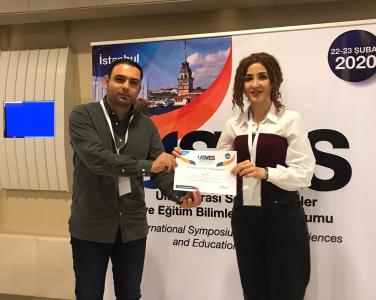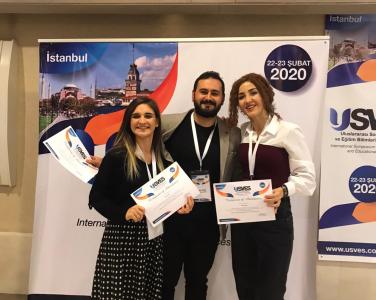The head of Radio, Television and Cinema Department, Assoc. Dr. Aybike Serttaş and ISU Studio Officer Yaren Kalkan presented two papers titled “Cultural Indicators and Cultivation Theory in the Context of Gender: The of Breadwinner (2017)” and “Ethical Inquiry of Augmented Reality Practices in Television News” at the International Symposium on Social Sciences and Educational Sciences.
The cultural indicators and the cultivation theory, which are the subject of the first paper, mention that the media has established an alternative reality to the audience as one of the socialization actors. According to The television-oriented theory of Gerbner (1979), television is a centralized storytelling system and the system reinforces the attitudes and values that exist in a culture. The meanings in the cultural fabric of television products are adopted by the audience and turn into perceptions of reality about the world (Gerbner, 1979: 180). This theory is also significant in terms of determining the great effects of television and other mass media on the audience. Based on the assumption that cinema has the ability to establish and consolidate reality as similar to other mass media tools, the work has traced the bacha posh tradition of a gender representation specific to Afghan culture in the movie “The Breadwinner” (2017). “The Breadwinner” (2017) is an important work on this subject, as it is the only animated movie with a story conveyed through the eyes of the main character.
As the subject of the second paper, technical opportunities in television journalism have increased in addition to the quality of sound and image. The main element of the news "5N1K" continues to dominate the creation of news text, while news production and editing techniques are constantly updated.
One of these current applications is augmented reality. The augmented reality technology is frequently used in different TV news types. The study questions whether this practice overlaps with news ethics codes. For this, after analyzing the issue of dramatization in the news, TV news containing augmented reality was determined and content analysis was conducted. As a result of the analysis, it has been determined that augmented reality applications are applied in different types of news, yet there is no standard distribution of these types, and the use of these applications in some news types causes dramatization and creates ethically problematic situations.




